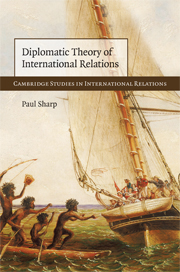Book contents
- Frontmatter
- Contents
- Acknowledgements
- Introduction
- Part I Traditions of international thought and the disappointments of diplomacy
- Part II Elements of a diplomatic tradition of international thought
- Part III Diplomatic understanding and international societies
- Part IV Thinking diplomatically about international issues
- 10 Rogue state diplomacy
- 11 Greedy company diplomacy
- 12 Crazy religion diplomacy
- 13 Dumb public diplomacy
- Conclusion
- Bibliography
- Index
- Cambridge Studies in International Relations
12 - Crazy religion diplomacy
Published online by Cambridge University Press: 05 June 2012
- Frontmatter
- Contents
- Acknowledgements
- Introduction
- Part I Traditions of international thought and the disappointments of diplomacy
- Part II Elements of a diplomatic tradition of international thought
- Part III Diplomatic understanding and international societies
- Part IV Thinking diplomatically about international issues
- 10 Rogue state diplomacy
- 11 Greedy company diplomacy
- 12 Crazy religion diplomacy
- 13 Dumb public diplomacy
- Conclusion
- Bibliography
- Index
- Cambridge Studies in International Relations
Summary
Whatever the problems posed by greedy companies and other economic actors for the effective conduct of diplomacy, it is easy to assume that they cannot be as bad as those posed by crazy religions, denominations and their members. The idea of “crazy religion” flags an apparently new and pressing challenge to the conduct of contemporary international relations. Since the attacks of “9/11” and subsequent events, largely in the United States, Western Europe, South West Asia and the Middle East, insurgent sects have appeared among peoples like hot cinders falling upon forests which, for reasons that to educated received opinion remain shocking and unfathomable, are dry and ready to burn. In a world rendered increasingly intelligible, controllable and exploitable by the application of scientific enquiry and technological discovery to human affairs, growing numbers of people are attracted to pre-scientific accounts of the world and their place within it. Not only that, they are prepared to be mobilized and to act on the basis of these understandings. What does this development tell us about people, the impact of modernization upon them and the prospects for peoples living peacefully together? The international relations of the Middle East often illustrate the problems posed by religion for diplomacy in their sharpest form. How does one negotiate with people who believe their title to a contested piece of land comes from God, and how do they negotiate with people directed by false gods or no gods at all?
- Type
- Chapter
- Information
- Diplomatic Theory of International Relations , pp. 243 - 265Publisher: Cambridge University PressPrint publication year: 2009

